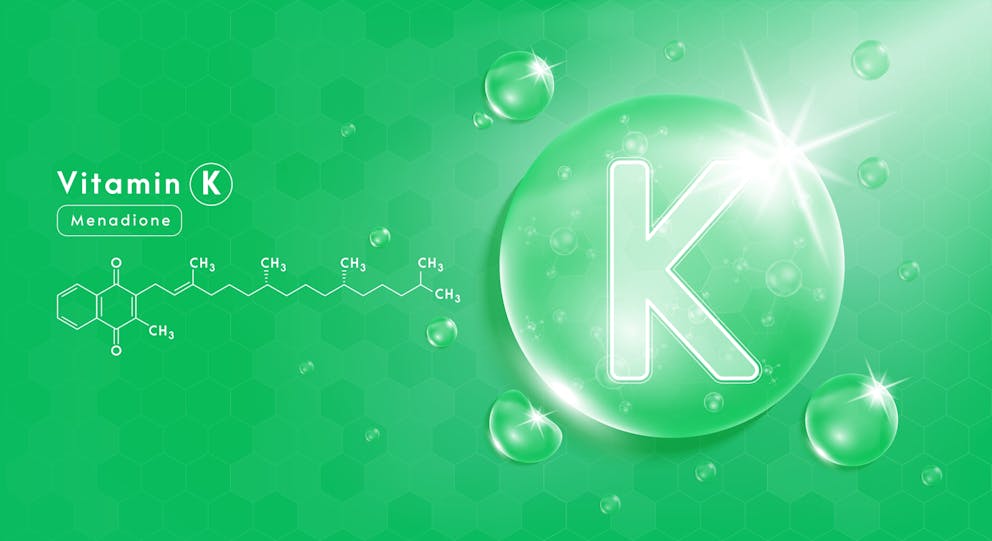What's the Difference between Vitamins K1 and K2?
Vitamin K is a fat-soluble vitamin that naturally occurs in two forms: vitamin K1 and vitamin K2.
While vitamins K1 and K2 regulate blood clotting, vitamin K2 is considered more effective and offers additional benefits, including regulating calcium balance and maintaining skeletal and cardiovascular health.
Discover what the difference is between vitamins K1 and K2 and find out how vitamin K2 supplements can help promote healthy bones and may lower the risk of heart disease.

What is vitamin K?
The majority of vitamin K is stored in the liver and in fat cells, and the body can draw upon these reserves when there is inadequate dietary intake or an increased vitamin K demand.
Although body stores of vitamin K are generally adequate to overcome short periods of insufficient vitamin K intake, a prolonged lack of dietary vitamin K can lead to deficiency.
Research published by The Harvard School of Public Health suggests that a daily vitamin K intake of 120 mcg for men and 90 mcg for women is sufficient to maintain healthy vitamin K levels in most adults.
While some vitamin K can be produced and recycled in the body, vitamin K-rich foods and supplements are the main sources of this essential nutrient.
Sources of vitamin K1
Vitamin K1, also known as phylloquinone, is predominantly found in leafy green vegetables.
Here are some of the best dietary sources of vitamin K1:
Kale
Turnip greens
Collard greens
Spinach
Broccoli
Brussels sprouts
Lettuce
Vitamin K1 can also be taken in supplemental form and is widely available in most health food stores.
Sources of vitamin K2
In contrast to vitamin K1, vitamin K2 is found in some animal products and fermented foods and can be produced by certain gut bacteria.
Because vitamin K1 can be converted into vitamin K2 via bacterial fermentation, fermented leafy greens and cabbages are excellent sources of Vitamin K2.
Here are some fermented foods rich in vitamin K2:
Natto
Sauerkraut
Kefir
Other dietary sources of vitamin K2 include oily fish, organ meat, egg yolks, butter, and cheese.
Vitamin K2 can also be produced by certain types of beneficial gut microbes. However, evidence published by the National Institutes of Health (NIH) suggests that bacterial vitamin K2 synthesis is unlikely to generate enough vitamin K2 to maintain healthy levels.
While dietary supplements containing vitamin K2 are less widespread than vitamin K1 products, they have been found to be more effective in maintaining healthy vitamin K status than vitamin K1.
Watch the video to learn more about the difference between vitamins K1 and K2.
What’s the difference between vitamin K1 and vitamin K2?
While vitamins K1 and K2 play a role in supporting overall health, their specific roles differ.
“Both vitamins K1 and K2 regulate and activate blood clotting proteins, which are crucial for proper blood coagulation and wound healing,” explains Dr. Berg. “Lack of adequate vitamin K intake can result in serious blood clotting disorders and excessive bleeding.”
In addition to regulating blood clotting, vitamin K2 also maintains calcium balance by redirecting calcium from the blood into bones.
Research published in Nutrients found that vitamin K2 has a greater bioavailability and a longer circulation time in the body than vitamin K1, making vitamin K2 a more potent and effective form for maintaining healthy blood clotting and calcium balance.
Although vitamin K supplementation is generally well tolerated and there is no evidence of vitamin K toxicity, vitamin K2 is associated with a lower risk of side effects compared to vitamin K1.

Four benefits of vitamin K
Vitamin K is an essential but often underappreciated nutrient that is vital for various physiological functions.
Here are four health benefits of vitamin K.
1. Supports bone health
Vitamin K2 activates a group of proteins known as matrix Gla protein (MGP) that bind to calcium and facilitate its deposition into bone tissue, which promotes bone mineral density and skeletal health.
Evidence published in The Journal of Osteoporosis suggests a link between osteoporosis and vitamin K2 deficiency and reports that vitamin K2 supplementation significantly reduces the risk of bone fractures.
2. Maintains calcium balance
Vitamin K2 works in synergy with vitamin D to maintain balanced blood calcium levels and promote optimal calcium stores.
While vitamin D enhances the intestinal absorption of calcium, vitamin K helps transport calcium into the skeletal system.
Taking vitamin D or calcium supplementation without adequate vitamin K levels can lead to elevated blood calcium concentrations linked to soft tissue calcification and heart disease.
Combining vitamin D3 with K2 offers several health benefits and has been found to lower the risk of bone fractures, osteoporosis, vascular calcification, and cardiovascular disease.
3. Promotes cardiovascular health
Because vitamin K2 maintains healthy blood calcium levels, it helps inhibit calcium accumulation in blood vessels and other soft tissues such as tendons and joints.
A study published in the National Library of Medicine found that vitamin K2 is associated with a lower risk of vascular calcification and arterial stiffness, a primary risk factor for atherosclerosis, coronary heart disease, and strokes.
4. Supports fetal bone development
Maintaining adequate levels of vitamin K2 while pregnant helps promote fetal bone growth and may lower the risk of postnatal hemorrhage, a potentially serious condition characterized by excessive bleeding after childbirth.

Signs of vitamin K deficiency
Although severe vitamin K deficiency is rare, research published in StatPearls found that almost 30 percent of the population may have insufficient vitamin K stores, leaving many at risk of skeletal issues, calcium imbalance, and heart disease.
Here are common signs of low vitamin K:
Easy bruising
Excessive bleeding
Poor wound healing
Soft and brittle bones
Recurrent infections
Blood in stool or urine
The liver regulates vitamin K absorption and storage, which leaves individuals with poor liver function, cirrhosis, or fatty liver disease at increased risk of vitamin K deficiency.
Taking a vitamin K supplement is an effective strategy to prevent deficiency and may be especially beneficial for those with impaired liver function or gastrointestinal conditions, including inflammatory bowel disease or Crohn’s disease.
While vitamin K supplementation is generally considered safe, it’s important to note that vitamin K can interfere with blood thinners, hormonal treatments, and antibiotics.
It’s recommended to discuss vitamin K supplements with a healthcare provider if you have a bleeding disorder or are taking prescription medications to minimize the risk of side effects.

Key takeaways
If you consider taking vitamin K to promote a healthy body, it’s important to know what’s the difference between vitamins K1 and K2.
Vitamin K2 is considered more potent than vitamin K1 and has been found more effective at maintaining healthy vitamin K levels.
Adequate intake of vitamin K2 is vital for skeletal and cardiovascular health and may lower the risk of soft tissue calcification, a leading cause of atherosclerosis, heart attacks, and stroke.
Additional resources
FAQ
1. What is the difference between K1 and K2?
Both vitamins K1 and K2 play a crucial role in blood clotting and wound healing and prevent excessive bleeding and other blood clotting disorders.
In addition to activating blood coagulation factors, vitamin K2 also regulates calcium balance and promotes the deposition of calcium into bone tissue, which lowers the risk of bone fractures, arterial calcification, and heart disease.
2. Is vitamin K2 better than vitamin K1?
Vitamin K2 is generally considered the more bioavailable and potent form of vitamin K.
Vitamin K2 has been found to be more effective at raising and maintaining vitamin K levels than vitamin K1 and is associated with a lower risk of side effects and drug interactions.
3. Should I take both vitamin K1 and K2?
It’s recommended to take vitamin K2 due to its role in blood clotting, calcium balance, and skeletal and cardiovascular health.
While vitamin K1 also activates blood clotting factors and prevents excessive bleeding, it’s not linked to calcium metabolism or bone health.
4. Is vitamin K2 really necessary?
If it’s really necessary to take vitamin K2 depends on your health goals and intended use of supplementation.
While vitamin K1 promotes proper blood clotting, vitamin K2 has additional benefits, such as improved bone health and a lower risk of heart disease, bone fractures, and osteoporosis.
5. Who should not take vitamin K2?
Vitamin K can interfere with blood thinners and hormonal treatments, and individuals with blood clotting disorders, those taking blood thinning medication, and postmenopausal women receiving hormone replacement therapy should discuss vitamin K supplementation with a healthcare provider.
6. What is the use of vitamins K1 and K2?
Both vitamins K1 and K2 play an essential role in regulating blood coagulation pathways, which prevents excessive bleeding and lowers the risk of blood clotting disorders.
In addition, vitamin K2 regulates calcium metabolism by depositing calcium into bone tissue. This promotes strong bones and balanced blood calcium levels linked to a lower risk of calcium deposits in arteries, a leading cause of heart disease and stroke.
7. Does the body make K2 from K1?
Yes, the body can convert vitamin K1 into vitamin K2 via bacterial fermentation by certain beneficial gut bacteria.
However, the rate of vitamin K1 to K2 conversion in the gut can differ from person to person, and evidence suggests that bacterial fermentation doesn’t generate enough vitamin K2 to promote optimal levels.
8. What is vitamin K3?
Vitamin K3, also known as menadione, is a synthetic form of vitamin K that’s mostly used in certain animal feeds to promote proper blood clotting in livestock.
The European Food Safety Authority reports that vitamin K3 may be toxic for humans and advises avoiding vitamin K3-containing supplements linked to liver damage, inflammation, and red blood cell reduction.
9. Can I take vitamins K1 and K2 together?
While it’s safe to take vitamins K1 and K2 together, combining them is unnecessary if you are taking a vitamin K2 supplement.
Vitamin K2 promotes healthy blood clotting and offers additional benefits to vitamin K1, including maintaining calcium balance, promoting skeletal health, and potentially lowering the risk of heart disease and osteoporosis.
10. Is it safe to take vitamin K2 every day?
Yes, taking vitamin K2 daily at appropriate doses is generally considered safe and well-tolerated by most healthy adults.
11. Can too much vitamin K2 be harmful?
While vitamin K2 toxicity is rare, taking too much vitamin K2 for prolonged periods may lead to kidney problems and impaired blood clotting pathways.
Most healthcare providers suggest that a daily vitamin K intake of 120 mcg for men and 90 mcg for women is adequate to maintain healthy vitamin K levels without the risk of side effects.
12. What are the signs of vitamin K deficiency?
Common signs and symptoms of vitamin K deficiency include easy bruising, excessive bleeding, bleeding gums, recurrent nose bleeds, poor wound healing, and soft and brittle bones prone to fractures.
Sources
Previous blog
Why Take Magnesium with Vitamin D? Benefits ExplainedTags

Popular
08/21/2024
55.7K views
02/23/2025
46.8K views
11/18/2024
281.1K views
03/18/2024
11/21/2022




